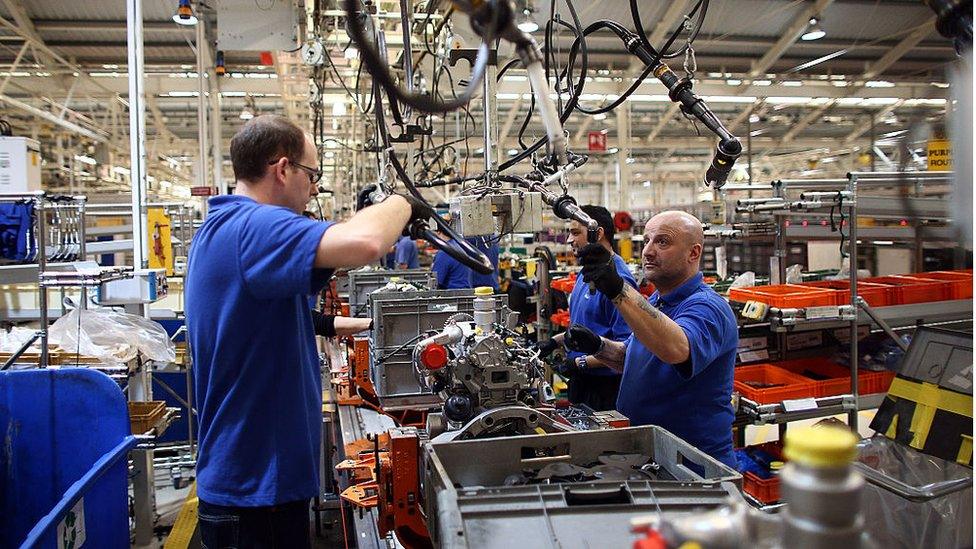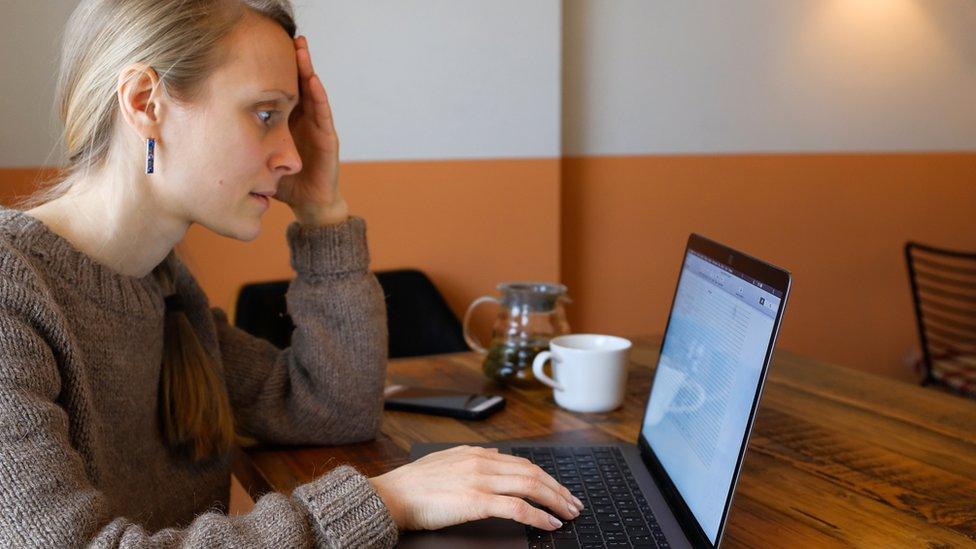Firms warn time is running out to save UK economy
- Published
- comments

Businesses are being hit by higher energy and fuel costs
The boss of a business lobby group has told the government to get its "house in order" to "save the economy" as firms struggle with higher prices.
Shevaun Haviland, director-general of the British Chamber of Commerce (BCC), told a conference that time is running out to help the economy grow.
It comes after Bank of England boss Andrew Bailey said soaring inflation could hit the UK harder than elsewhere.
The government said it was supporting firms to "navigate the months ahead".
Ms Haviland told audience members at the BCC's global annual conference that the government has "until the Autumn budget to reset, rethink and get their house in order".
Rising material costs, supply chain issues and worker shortages are creating a "perfect storm", she said.
A Treasury spokesperson said the government had "cut taxes for hundreds of thousands of businesses" by increasing the employment allowance and cutting fuel duty.
The Treasury said it was supporting British businesses through measures such as bringing in 50% business rates relief for eligible High Street businesses, and freezing an amount it uses to calculate rates which will be "worth £4.6m over the next five years" for firms.
Prices are rising at their fastest rate for 40 years with UK inflation at 9.1% in May.
Figures released on Thursday, external showed that household finances failed to keep up with inflation in the first three months of the year, marking the first time real disposable income has fallen for four quarters in a row since records began.
Businesses are also being hit by higher prices, with fuel and energy prices at unprecedented levels.
On Wednesday, the governor of the Bank of England, Andrew Bailey, warned that soaring inflation would hit the UK harder than any other major economy during the current energy crisis.
He said the UK's economy would be likely to weaken earlier and the effects would be more intense than for other countries as a result of the energy price shock and labour shortages.
Mr Bailey did not rule out the possibility of interest rates rising by half a percentage point in future to try to curb inflation. Rates are already at their highest for 13 years, at 1.25%.
"There will be circumstances in which we will have to do more [on rates]," he said. "We're not there yet in terms of the next meeting. We're still a month away, but that's on the table."

Businesses are having to deal with pressures including higher energy costs
The BCC's Ms Haviland said that higher costs for raw materials over last summer, supply chain and shipping issues, problems in recruiting people, and future energy price rises were "firmly putting the brakes on" the country's economic recovery from the pandemic.
The energy price cap, which limits how much suppliers can raise the cost of household bills, went up to an unprecedented £1,971 in April for the typical household. This was a rise of about £700, and the cap is expected to rise by a further £800 a year in October.
But unlike households, the energy price cap does not apply to firms, which the BCC says means they cannot predict what bills will be from one month to the next.
Export 'challenges'
Official figures released on Thursday showed that in the first three months of the year the UK's current account deficit - the gap between the value of goods and services imported compared with exports - hit the largest shortfall since records began in 1955.
The deficit was £51.7bn in the January-to-March period, equivalent to 8.3% of GDP, although the Office for National Statistics advised "caution" over the figures as they were "subject to higher levels of uncertainty than normal" because of changes in the way the data is collected.
Ms Haviland spoke to Chancellor Rishi Sunak at the BCC conference, saying firms were also facing "a lot of challenges" in exporting to the EU following Brexit.
Mr Sunak said: "Of course, there has been a change in our trading relationship [with the EU], that was always going to be the case, and you'll know that the government is looking at how we can ease some of those burdens further, particularly on the Northern Ireland side."
On Monday, MPs gave their initial approval to new legislation to give ministers the power to scrap parts of the post-Brexit deal between the UK and the EU. The EU opposes the move, saying it breaches international law.
Mr Sunak added that the government had plans to "make sure our customs procedures in this country are globally best in class".
Fears over the prospects for the UK economy have grown after latest figures showed it shrank in April.
It has led to some analysts warning the UK risks falling into a recession, which is defined as the economy shrinking for two consecutive three-month periods.
The cost of living has pushed unions to demand pay rises, leading to some workers going out on strike in recent weeks, with more walkouts planned over the summer.
RMT Union members walked out last week in what was said to be the largest industrial action since 1989, with services across the country cancelled.
More rail workers are set to walk out along with Royal Mail staff in July. British Airways check-in staff at Heathrow Airport have also voted to go on strike over pay.
Ms Haviland said that a solution to strikes would come from "cooperation not confrontation, because the consequences of ongoing strikes will have a major impact on everyone".
Are you struggling with the rising cost of living? Email haveyoursay@bbc.co.uk, external.
- Published13 June 2022

- Published14 June 2022

- Published9 June 2022
